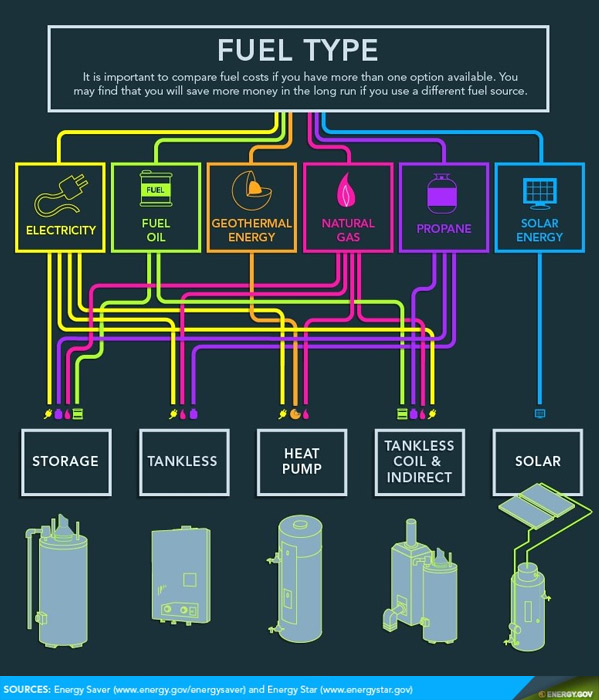There are many ways to save when it comes to producing hot water for your daily routines. These range from stopping leaks and drips and insulating water pipes to larger projects, such as switching to high efficiency water heating units when it’s time to replace an old, inefficient or damaged system. Tips that may help you save energy and water include:
-
Make sure you’re not wasting hot water by installing low-flow water fixtures, choosing a cold water setting when washing your clothing, and turning off the hot water when you are not using it.
-
Insulate your hot water pipes to reduce heat loss and raise water temperature higher than uninsulated pipes can deliver. This may allow you to lower your water temperature setting, although you should be careful to not lower your hot water setting below a safe temperature. You may also be able to conserve water by not having to wait as long for hot water when you turn on a faucet or shower head by optimizing piping systems, and/or utilizing an on-demand domestic hot water circulation system.
-
If you are considering a new hot water system, ENERGY STAR® certified water heaters are generally an easy choice for energy savings, performance and reliability, and typically save you money.
Water heating systems use a variety of fuel sources, including electricity, gas, propane, oil and solar energy. Combination or “combo” systems use a water heater to heat the domestic hot water (hot water used for drinking, food preparation and sanitation), as well as provide space heating for the building. Options can generally be separated into two categories:
-
Storage systems have insulated water tanks, which stratify hot water at the top and cold incoming water at the bottom. The plumbing is set to draw off hot water (from the top), and the cold water is heated at the bottom. These can be either “direct-fired” or “indirect-fired”. (See the Storage section for more information.)
-
Tankless (sometimes called “on-demand” or “instantaneous”) systems are designed to heat water very quickly and distribute it directly through pipes. These can be “no coil” or “coil” types. (See Tankless section for more information.)
Planning Ahead
An average water heater can last about 10-15 years, though not all last that long. Replacing your old water heater before the end of its life may mean you can realize savings earlier, while helping to avoid a costly clean-up if your old unit fails. Since no one system is just right for every setting, it's worth doing some research ahead of time, so you can be prepared when replacement time comes. The energy factor (EF) indicates a water heater's overall energy efficiency, based on the amount of hot water produced per unit of fuel consumed over a typical day. This includes:
-
Recovery efficiency – how efficiently the heat from the energy source is transferred to the water
-
Standby losses – the percentage of heat loss per hour from the stored water, compared to the heat content of the water (in water heaters with storage tanks)
-
Cycling losses – the loss of heat as the water circulates through a water heater tank, and/or inlet and outlet pipes
Typically, the higher the energy factor, the more efficient the water heater should be. However, higher energy factor values don't always mean lower annual operating costs, especially when you compare fuel sources. Product literature from a manufacturer usually provides a water heater model's energy factor, but you may decide not to choose a water heater model based solely on its energy factor. When selecting a water heater, you may also want to consider:
-
Initial cost, including purchase and installation
-
Lifetime energy costs, which typically far exceed initial costs
-
Warranty, which can be an indicator of product life
-
Capacity, to ensure adequate hot water
-
Space requirements
-
Incentives, including rebates and tax credits
Learn More
Energy.gov offers an entire section on water heating and the different types of water heaters available, which you can visit at the links below:
Visit the pages below to learn more about different types of Hot Water systems:





